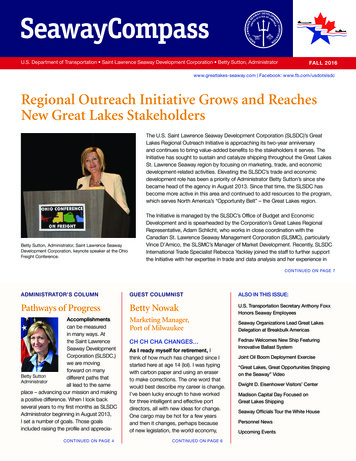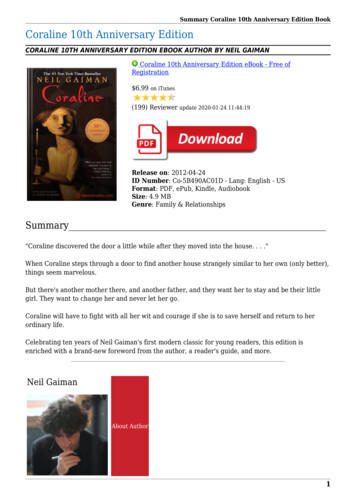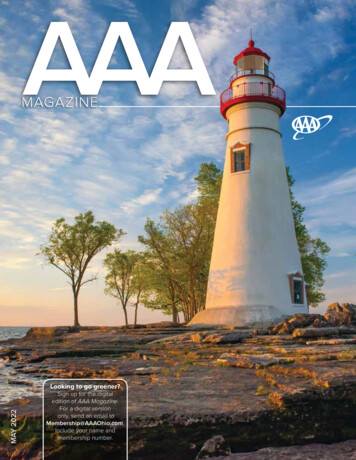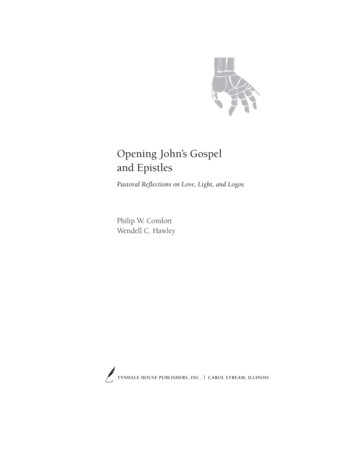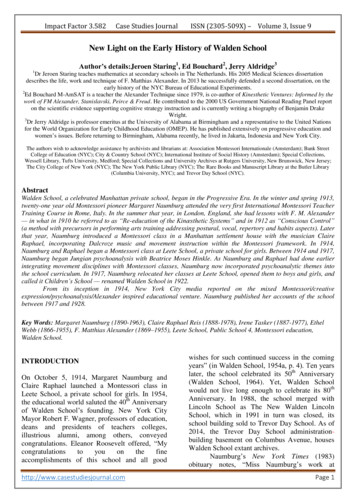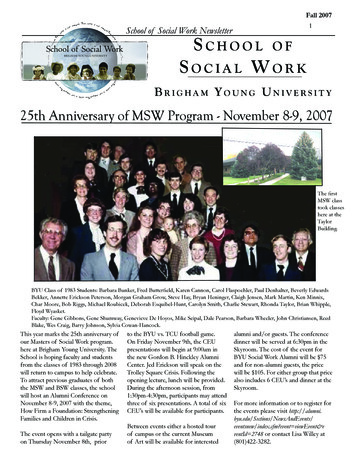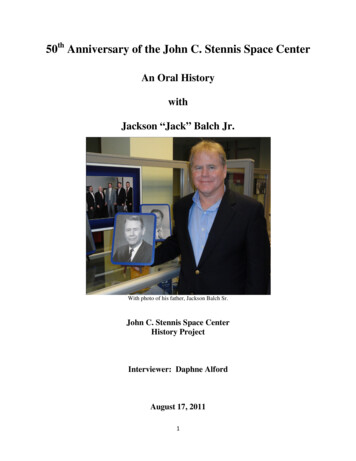
Transcription
50th Anniversary of the John C. Stennis Space CenterAn Oral HistorywithJackson “Jack” Balch Jr.With photo of his father, Jackson Balch Sr.John C. Stennis Space CenterHistory ProjectInterviewer: Daphne AlfordAugust 17, 20111
An Oral HistorywithJackson “Jack” Balch Jr.This is an oral history interview with Jackson Balch Jr., the son of the second site manager of theMississippi Test Facility, Jackson Balch Sr. This interview is being conducted on August 17,2011, in conjunction with the 50th anniversary celebration of the John C Stennis Space Center.The interviewer is Daphne Alford.Daphne Alford: Mr. Balch, please give a little background information about yourself –education, employment and family.Jack Balch: Jackson Balch Jr., I'm the fifth child of six of Jackson Balch and Janet Diehl Balch,the third of four sons and two sisters. I was born in Huntsville, Alabama, lived there for 10 yearsand moved in 1965 to the Mississippi Gulf Coast, where we lived in Pass Christian. Dad wastransferred as a NASA director to Mississippi from Huntsville to be the director at what was thenthe Mississippi Test Facility. I went to elementary school in Pass Christian, and I went to highschool in Bay St. Louis at St. Stanislaus graduated in 1974; went to the University ofMississippi, graduated in 1978, the Bachelor of Arts; and went back to school at USM inHattiesburg and got into computer science, which is what I've done most of my life since then it'sthe computer industry information systems. [I] worked out here for a bit with Computer SciencesCorporation. One summer I worked with General Electric, the last year they were here I was theprimary technical contractor for NASA 1975, when I was in school and then with ComputerSciences Corporation from 1979 to ’83 and then again with Computer Sciences Corporation atKeesler, where I managed a simulation project for the Air Force. Subject to that, I was back outhere with Mississippi Army Ammunition Plant, served with Mason Chamberlain for a couple ofyears and then, actually I got that backwards. I was there before I was at Keesler, so I had thatbackwards. I was at Keesler after that. There were two stints with CSC in between with MasonChamberlain and then following that, I worked with a systems consultant. We had a consultantcompany that did some work with Shell Oil in New Orleans and Houston and some localbusinesses in Mississippi and did that for several years and then I got into the healthcareindustry, but all in information technology and information services. That's where I presently am.I work with Hospital Corporation of America out of Nashville, HCA, and we administer 162hospitals around the United States, and I'm part of the Delta Division, which is Louisianahospitals and one hospital in Mississippi, which is Garden Park.Daphne Alford: And what's your position?Jack Balch: I'm an Information Services Director with HCA, working primarily out of GardenPark Medical Center.2
Daphne Alford:. Now let's go back to 1965 when your dad was assigned to the Mississippi TestFacility, transferring from Marshall, moving his family to Pass Christian. Tell me about theBalch family – your parents, siblings.Jack Balch: In 1965, there were six children – four boys, two girls. The two girls were the oldestand my oldest sister, Jane, had graduated from Auburn by that time. So she never migrated downwith us. She had gone to work teaching in Georgia, and so she didn't make the move in ‘65 toMississippi Gulf Coast when we did. We were in a small little three-bedroom, one bath, if Iremember house, the three boys were in one room, the two girls in another and my mother, fatherand the baby, he would have been 5. I don't think he ever did leave their bedroom. Go figure thatone. But anyway, we moved to Pass Christian. Dad had come down here, appointed as one of thedirectors as I said earlier. He was here before us in the summer of ’65, and we actually movedaround Labor Day. I think the first day in the house we had purchased in Pass Christian on thebeach, was the day that Hurricane Betsy hit in 1965, so it was an interesting welcome becausethere was no furniture and we were laying on old dirty mattresses and hearing this thunderousstorm outside, not knowing what was going on. It was a rather verboten sort of introduction tolife in a hurricane zone.Daphne Alford: So do you remember that address?Jack Balch: 624 West Beach, Pass Christian. I remember it well. I sure do.Daphne Alford: Before you started to work, I'm sorry I think we forgot to talk about yourfamily, wife and children. Would you like to mention?Jack Balch: Yeah. I'm married to formerly Kimberly Truett. We've been married 12 years, andwe have one 5-year-old daughter, Amelia, who just started kindergarten this year.Daphne Alford: Alright, I know that you mentioned your employers you work for out here, butbefore you started to work, did you ever come out and visit your dad?Jack Balch: We did. I can remember a time or two, particularly on the weekend, I would rideout with dad, ride the car and listen to him talk about what he did, smell his pipe smoke or cigarsmoke whatever it was at the time, and we would come out and we would go sit in his office inBuilding 1100. I think at the time, it was the second floor, where his office was and I rememberhe had a little device that connected to the phone, you know it's nothing nowadays, but it was aspeaker phone, and it was the first time I'd ever seen one. So I remember him calling his father,who was alive at the time in the ‘60s, and I was astonished about that. I was also astonished morewith what was out here, what was going on with the whole space program and the testing of theSaturn engines here. We drove what seemed to be for an eternity to get out here and, yet, whenwe were out here it was pretty phenomenal what was so high-tech at the time, came out ofnowhere, being an area in this buffer zone, what used to be swampland and all of a suddenthere's this hi-tech stuff at the time – rockets and space and the space race we were goingthrough. It was a really interesting time to be a part of that so it was fun to come out.3
Daphne Alford: Your dad was very concerned about this facility at the end of the ApolloProgram, and he worked very hard along with Senator Stennis to transform it into a multi-agencyfacility. Can you recall what life was like during that time period?Jack Balch: That's a good question. I do. It was a pressure-packed time. I think about years, Ithink about ’69, which was an eventful year for the country. We’d gone to the moon. It was aneventful time. We had gone to the moon July 21 when Apollo went off, and I knew that therewere some rumblings about the space program. What's the long term? Where we going to gonow that we've done this? What's going to be the next thing although we knew we had moremoon shots planned, and we were still testing out here? But I remember that year, losing my lasttwo grandparents. I remember Camille hit, 42 years ago this day. That same year, it hit inAugust. We went up to the moon in July ‘69 and August 17, ’69. We had Hurricane Camille andthe effects of that and actually what the role of the MTF at the time, and dad's role in helping thelocal communities recover. Because NASA, at the time, had a lot of resources such ascommunications, probable water things like that. They were able to reach out to somecommunities and provide some support, where that support didn't exist, whether it be PassChristian, particular Bay St. Louis, Hancock County. It was extraordinary. It wasn't particularlyfollowing any governmental protocol, but it probably helped save some lives. So it was a criticaltime of year, and the year subsequent to that is when we get into the site looking to bedowngraded or worse yet mothballed or some similar kind of process and that's what I remembermy dad struggling with greatly is to what could he do? What could they do to establish somecontinuance of operations that would envision something for the future and still be a real benefitto the community? It was a real struggle for him to do that. There were dreams there, and Iparticularly remember he would come home and he would sit in a lounge chair and he woulddoze off from exhaustion. He would mumble words in his sleep, and I knew it was stress forwhat he could do. I could see it on his face, and I could hear it in those rumblings. This went onfor a couple of years, and I know in the middle of the night he would call people – people heworked with and, they would strategize. They would argue. They would whatever, about ‘whatwe can do to continue the operations,’ and I know he made some real enemies along the waywith the NASA hierarchy up in Huntsville and really bypassing them and going to workingthrough Senator Stennis's office and Allen Ellender, senator of Louisiana, and probably JimEasterling, another senator from Mississippi, primarily Stennis. [He] did a lot to go around thegovernmental normal channels and probably upset folks at NASA headquarters with the idea of‘what can we do to perpetuate this facility and what can we do,’ and that's where the dream of amulti- agency, multi-entity, facility, began to emerge.Daphne Alford: Well, I think it was good that he saw what it revolved into after all that hardwork and, at least, he saw it, and it's still functioning for 45 years later.Jack Balch: That's a real testament, and he was in there with a lot of the people who were along,who contributed to the dream and then the reality.Daphne Alford: So this was like a double dose of pressure, dealing with the transformation,along with the recovery of Hurricane Camille. That was like a double dose, and I want to say thatI read somewhere can you go back, 42 years today, the next day, August 18? Because Iremember reading, I read a lot, and I want to say that he was at home when that happened.4
Jack Balch: When Camille hit?Daphne Alford: YeahJack Balch: He was at home, and he was at home with my two older brothers – Arthur andMichael. It hit on that Sunday night, which was August 17, 1969, which happened to also be mybrother Arthur's birthday. I can't remember how old he was. He might have been 19. It was hisbirthday and at that time we, my mother and younger brother, Victor, stayed out at Building1100, the administration building, in his office, along with several other families of theMississippi Test Facility workers. And, obviously, there was some staff that was here, I do recallRoy Estess being here, and he was a much younger fellow at the time. One point we had apicture of him, that was one we lost, but had a memory of a two- or three-day-old beard, and hewas just so young. We stayed here, and it was a violent night because here it was pretty safe.They were pretty fortified buildings; I do recall the parking lot. A lot of people had rolled theirwindows up for the storm and what happened, the pressure from the hurricane, the low pressure,just blew a lot of the windows out of the cars. It just cracked them. And you know there wassome wind damage, along the pine trees here, and they were messed up. We had no idea, therewas very little communications at that time with local entities, like civil defense and emergencyservices people. It was early on in the development of those things. So really we did not knowthe condition of not only those communities, but of my father and my two brothers. And webegan to hear little by little that night and into early morning on the 18 that it was devastating. Itwas bad. In the little town we were in I can't recall how many, but there was quite a few peoplekilled, over a hundred. And we lost some neighbors, but yeah, it was a traumatic time and veryconcerning until somehow later on that day. I think my oldest brother Arthur and dad got out tothe site so we were relieved, and we understood that my brother Michael was staying back tohelp with some recovery. My sister, Peggy, had stayed with another family and they were OK.They were safe. That's when we heard those stories of what happened. They got through thenight.Daphne Alford: So you lost your home, the family home?Jack Balch: Yeah, the family home had to be demolished. In the next month or two, it wasdemolished. It had been an old home. It had been probably 75 years old, 60 odd years old. So ithad endured other storms over the years, but it didn't this one.Daphne Alford: So did y’all rebuild in the same location?Jack Balch: We didn't. We actually sold that property, and we moved to a location in PassChristian on the beach, but at a lower elevation, which I've always wanted to ask my father. Ithink he got a good deal on the property. That's why he did, and we built there and we were backin 1971 we moved into the house.Daphne Alford: So was it more than three bedrooms?Jack Balch: It was more than three bedrooms. It was bigger this time, it sure was.5
Daphne Alford: Your dad retired from NASA in 1975. What was life like for him afterretirement, and was he still active in the community?Jack Balch: Yeah, he was. He did some consulting work. At that time he ended up workingwith the governor of Mississippi, Cliff Finch, who he told he didn't vote for him, but he said, ‘I'llbe glad to work for you since you came to me.’ At that time it was the Clean Water Act that hadbeen enacted and communities were having to scramble in short time to get sewage treatmentcapabilities built. So he worked with the governor on that so they could get some federalmatching funds, which would help to do that. And so he worked with that, he worked with someof the municipalities in the counties and south Mississippi – Harrison, Jackson and Hancockcounties to try to get a multi-county approach towards environmental protection, you know,mostly dealing with water and sewage treatment. So he continued to be very active. I will say hewas a little less stressed. I think a better husband and a better family man. It was becoming toemerge. I think some of the weight of the pressure he had been under began to lift.Daphne Alford: When he was assigned here by von Braun to come down from Huntsville, hehit the ground running. He was ready for this challenge. Did he expect this or was it totallydifferent would you say?Jack Balch: I think my father was pretty ambitious, and he relished it. He actually was one ofthose people, probably some “Type A” personality. He was more at home in a stressful situation.So he was his own worst enemy in that regard, but he also became bored with the day-to-dayroutine. So I don't think he necessarily manufactured his own misery, but when there waschallenges, he was ready for them, and he was excited about them.Daphne Alford: Well he accomplished a lot, and it takes people like that.Jack Balch: He would grab something, and he would learn everything he could about it.Everything he could, he would just go with it, and he would apply a lot of thinking to how to goabout accomplishing something?Daphne Alford: That's good. Now, you said he was born in Canada and went to school inIreland, so did you ever visit those places?Jack Balch: No, I haven't been to all of them, but I have been to a few places. I still want to goto Ireland. He went to Trinity College there, which houses the Book of Kells, which is theoriginal English manuscript of the Bible, the first manuscript of the Bible in English, they housethat there. So I want to go there, and obviously, he went to college there as his younger brotherdid, too. He was a chief of surgery at Georgetown. They went there. He went to high school inMonterey in Mexico. I haven't been to Monterey. I think it's a very industrial town and, ofcourse, Mexico is a little violent now. But I would like to go there, too. I did go to Madrid. In1936, he said he was in Madrid. He had learned Spanish and was actually immersing himself inthat culture before the war to try to really learn not only the culture, but the language, to just bespeaking Spanish. He was there when the Spanish Civil War was going on, and he remembersthe German tanks that came there to support the Fascist regime at the time. So I had been there. I6
haven't been to Australia. He lived there as a kid, and my brother Michael is named after one ofhis best friends in Australia as a kid, who was unfortunately killed in World War II, MichaelBergman. Michael was named after him and he has been to Australia, and he has met that familyand they were just wonderful. They did the sheep thing, where they took the wool off the sheepand all of that.Daphne Alford: He lived an interesting life.Jack Balch: He really did. All those places in the world, and it gave him a really broad view ofthings, even though he had been an engineer. He wasn't just a numbers person. I think he had thatclassical education. So it wasn't just, he understood literature and history as well as a technicalengineering, there was a real blend.Daphne Alford: Did any of your siblings follow in your dad's footsteps at NASA inengineering?Jack Balch: Sort of but not directly. None of us are engineers, interesting to say. My brotherMichael has been with Global Associates, later with Martin Marietta and now Lockheed Martinand to this day he's been with them 30 years. So he's just turned 60 years, and he's worried about[inaudible] His middle son is at Mississippi State in engineering, sophomore, and then hisyounger son is graduating from high school. His older son is an engineer, and then my brotherVictor is a contractor. He's a vice president or contractor or something with.Daphne Alford: Radiant something, I got it on an email.Jack Balch: Yeah. They have some air space work, and he's done a lot of that.Daphne Alford: But not directly with NASA.Jack Balch: Nobody, no NASA directs. Dad's sister, Sylvia, who is still alive, was a NASAemployee. She's retired – her and her husband.Daphne Alford: What did she do?Jack Balch: I don't know what she did. She's retired now, and she knew von Braun, too. Shewould know of those surviving. She would remember those days way back. She was youngerthan my dad, two boys and one girl, and she was the girl.Daphne Alford: And Victor told me that your mom is 88 now.Jack Balch: She's 88.Daphne Alford: That's good. And she would love to come back?Jack Balch: She'd love to come back. I don't know if that will happen. We're hoping to get herdown here in a couple of weeks to visit, I really do.7
Daphne Alford: What about von Braun? What do you remember?Jack Balch: I remember he had a neat sports car. And he would zip all around town. I remembermy aunt Sylvia talking about [him]. I guess it was one of his children and her daughter,Elizabeth, taking dance somewhere and von Braun was there, and they were dancing, and he waskind of a colorful figure.Daphne Alford: But no direct contactJack Balch: No, I met him a couple of times, but I don't remember him a lot. I would have beenless than 10. Neat guy.Daphne Alford: And we talked about Patricia Baker, you dad's.was she the only secretary?Jack Balch: Ann and Patricia seemed to have worked together a lot. And they both were thesweetest people and bright and sharp. And the fact that they could deal with my dad, I think thatthey saw, my father really, as tough as he was, there was really clearly a really good heart inthere. People really were always concerned, and I think they knew him enough to get passed thatrougher edge or sometimes his volatile behavior. They knew him, and they respected him and herespected them.Daphne Alford: That's the way to go. Now, that it's 50 years later. Stennis is still here, due toyour dad's vision 45 years ago. What do you think he would say about Stennis today?Jack Balch: What would he say? I think he would be pretty amazed that it is still here. He wouldbe very happy that there is this technology transfer and the sharing of laboratories and rockettesting and the sciences and the engineering that our country, that our world has benefited as aresult of having that kind of technology transfer. I think he would feel that's a realaccomplishment and a real gold star for the area, for the community that it is here. And it's notnecessarily replicated that way elsewhere .[Informal Conversation]Yeah, I think he would have found it pretty extraordinary that it has endured. He would be verycurious as to how it really evolved since then. Did it in fact, and I believe the answer is yes in alot of ways. Was there really that sharing of information, sharing of science and engineering thatwas envisioned? Did it really produce? I would have tosay the answer is yes because it's here, and there are the multiple agencies and universities andentities that are here. I'm not sure how many people are here, but it's quite a few thousand.Daphne Alford: Yeah, I think it's four or five thousand, about five thousand.Jack Balch: So that's substantial. That's a real testament.Daphne Alford: Very good in economic development.8
Jack Balch: Huge impact on economic developer -- St. Tammany Parish, Hancock County,Pearl River County, Harrison County and beyond – Forrest County and Lamar County.Daphne Alford: And beyond that because I think someone told me somebody commuted fromMobile. So it's all over. Is there anything you would like to mention that I didn't ask?Jack Balch: You know, it was an extraordinary time back then, and there was a phenomenalsense of pride that I saw in pride. And I remember it from being out here when I worked withGeneral Electric that last year, and it was a tough time for General Electric. They had lost thecontract. A lot of their guys had been longtime GE people, and they were not sure what theywere going to do, were they going to transfer to Schenectady, New York, Pennsylvania,California or Minnesota. Wherever it was and stay here in some capacity with CSC who tookover the contract. But the people that I remember then – when I did work that summer when Iwas in college – they just had this confidence. They had this air about them that they were on theforefront of something very, to be very proud of, that we had achieved something that seemed tobe almost impossible.Daphne Alford: And you were a part of that by working here?Jack Balch: I had no real part being a co-op student, but those guys did, and they put in a loteffort and a lot of hours and sacrifice and sacrifice in terms of, they could have gotten paid bettermaybe elsewhere. They could have lived elsewhere if they preferred to, but I think there was justthis phenomenal pride that was there. I remember I said, that's what we should all, in our careersand in our work, we should all aim towards finding that. You can participate in something that'sfor the greater good, and it is and has been for the greater good. Sometimes we lose touch of thatwhen all the politics gets around and that seems to mess it up but there has been so much that'sbenefited mankind as a result of this and when you feel you're part of that, I don't know, I couldsense that it was there and heard it in their tone and their temperament and in direct words thatthey've said. The different people that were around at that time.[Informal Conversation]Daphne Alford: I really appreciate you taking out time for this interview. It was fun.Jack Balch: Yeah, it was for me too, Daphne, and thank you for allowing me to.Daphne Alford: And you’ll have to come back.9
Jackson "Jack" Balch Jr. This is an oral history interview with Jackson Balch Jr., the son of the second site manager of the Mississippi Test Facility, Jackson Balch Sr. This interview is being conducted on August 17, 2011, inconjunction with the 50th anniversary celebration of the John C Stennis Space Center. The interviewer is Daphne Alford.



